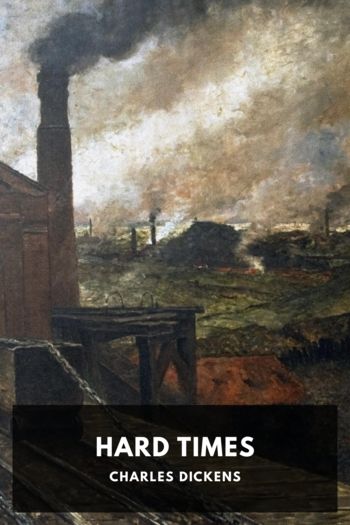Hard Times Charles Dickens (motivational books for men .TXT) 📖

- Author: Charles Dickens
Book online «Hard Times Charles Dickens (motivational books for men .TXT) 📖». Author Charles Dickens
“I say! Look sharp for old Bounderby, Loo!” Tom remonstrated.
“There’s no more to tell, Miss Louisa. I keep the nine oils ready for him, and I know he will come back. Every letter that I see in Mr. Gradgrind’s hand takes my breath away and blinds my eyes, for I think it comes from father, or from Mr. Sleary about father. Mr. Sleary promised to write as soon as ever father should be heard of, and I trust to him to keep his word.”
“Do look sharp for old Bounderby, Loo!” said Tom, with an impatient whistle. “He’ll be off if you don’t look sharp!”
After this, whenever Sissy dropped a curtsey to Mr. Gradgrind in the presence of his family, and said in a faltering way, “I beg your pardon, sir, for being troublesome—but—have you had any letter yet about me?” Louisa would suspend the occupation of the moment, whatever it was, and look for the reply as earnestly as Sissy did. And when Mr. Gradgrind regularly answered, “No, Jupe, nothing of the sort,” the trembling of Sissy’s lip would be repeated in Louisa’s face, and her eyes would follow Sissy with compassion to the door. Mr. Gradgrind usually improved these occasions by remarking, when she was gone, that if Jupe had been properly trained from an early age she would have remonstrated to herself on sound principles the baselessness of these fantastic hopes. Yet it did seem (though not to him, for he saw nothing of it) as if fantastic hope could take as strong a hold as Fact.
This observation must be limited exclusively to his daughter. As to Tom, he was becoming that not unprecedented triumph of calculation which is usually at work on number one. As to Mrs. Gradgrind, if she said anything on the subject, she would come a little way out of her wrappers, like a feminine dormouse, and say:
“Good gracious bless me, how my poor head is vexed and worried by that girl Jupe’s so perseveringly asking, over and over again, about her tiresome letters! Upon my word and honour I seem to be fated, and destined, and ordained, to live in the midst of things that I am never to hear the last of. It really is a most extraordinary circumstance that it appears as if I never was to hear the last of anything!”
At about this point, Mr. Gradgrind’s eye would fall upon her; and under the influence of that wintry piece of fact, she would become torpid again.
X Stephen BlackpoolI entertain a weak idea that the English people are as hard-worked as any people upon whom the sun shines. I acknowledge to this ridiculous idiosyncrasy, as a reason why I would give them a little more play.
In the hardest working part of Coketown; in the innermost fortifications of that ugly citadel, where Nature was as strongly bricked out as killing airs and gases were bricked in; at the heart of the labyrinth of narrow courts upon courts, and close streets upon streets, which had come into existence piecemeal, every piece in a violent hurry for some one man’s purpose, and the whole an unnatural family, shouldering, and trampling, and pressing one another to death; in the last close nook of this great exhausted receiver, where the chimneys, for want of air to make a draught, were built in an immense variety of stunted and crooked shapes, as though every house put out a sign of the kind of people who might be expected to be born in it; among the multitude of Coketown, generically called “the hands,”—a race who would have found more favour with some people, if Providence had seen fit to make them only hands, or, like the lower creatures of the seashore, only hands and stomachs—lived a certain Stephen Blackpool, forty years of age.
Stephen looked older, but he had had a hard life. It is said that every life has its roses and thorns; there seemed, however, to have been a misadventure or mistake in Stephen’s case, whereby somebody else had become possessed of his roses, and he had become possessed of the same somebody else’s thorns in addition to his own. He had known, to use his words, a peck of trouble. He was usually called Old Stephen, in a kind of rough homage to the fact.
A rather stooping man, with a knitted brow, a pondering expression of face, and a hard-looking head sufficiently capacious, on which his iron-grey hair lay long and thin, Old Stephen might have passed for a particularly intelligent man in his condition. Yet he was not. He took no place among those remarkable “hands,” who, piecing together their broken intervals of leisure through many years, had mastered difficult sciences, and acquired a knowledge of most unlikely things. He held no station among the hands who could make speeches and carry on debates. Thousands of his compeers could talk much better than he, at any time. He was a good power-loom weaver, and a man of perfect integrity. What more he was, or what else he had in him, if anything, let him show for himself.
The lights in the great factories, which looked, when they were





Comments (0)